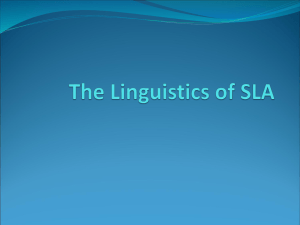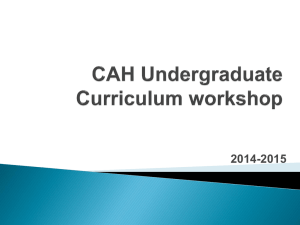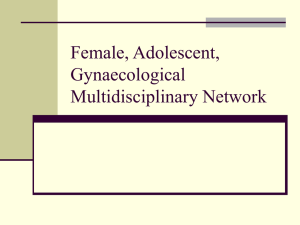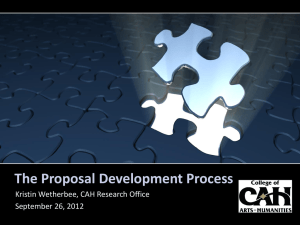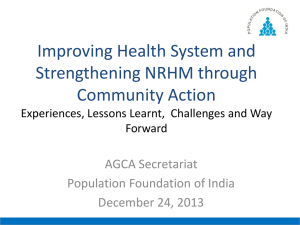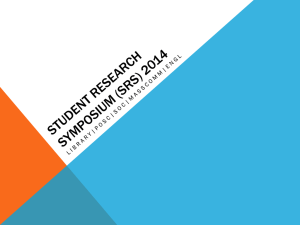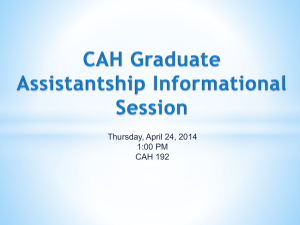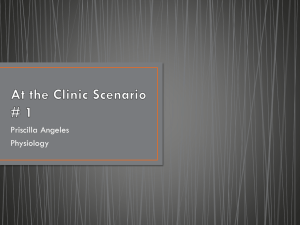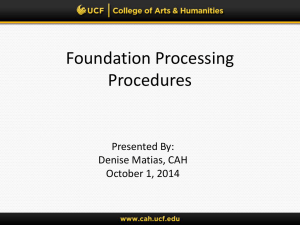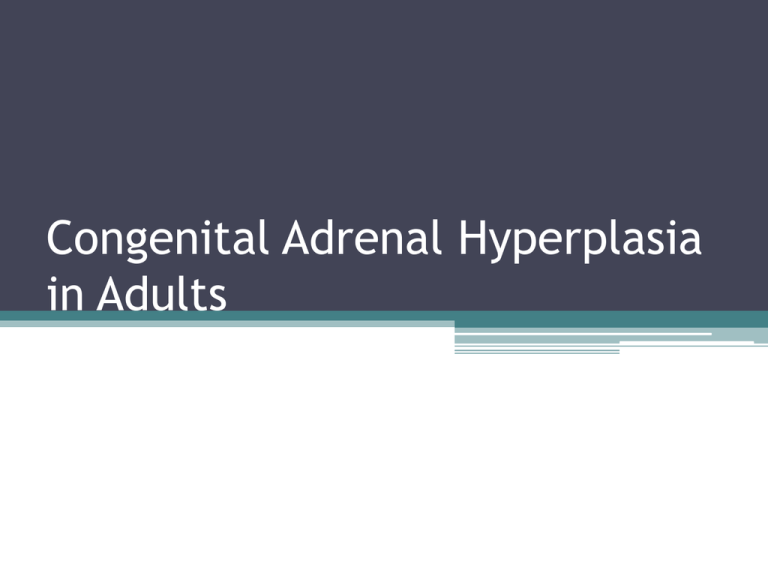
Congenital Adrenal Hyperplasia
in Adults
OBJECTIVES
• To review the treatment of classical CAH in
adult endocrinology practice
• To review the diagnosis and treatment of nonclassical CAH in adult endocrinology
A bit of Background
1865
Autopsy on G Marzo found:
• 6 inch penis with hypospadias
• No testes
• Normal vagina, uterus, F tubes and ovaries
• Large adrenal glands
was female at birth, then judged to be male by 4
years of age
Historical case continued
• Functioned normally in society as a man
• Suffered episodic vomiting throughout his life
• Died ~40 yrs old after an episode of vomiting
Some SJHC cases
CASE #1
• 36 yr old woman seen in Dec 2013, cook
• Diagnosed with CAH at 6 months of age when
genital abN found
• No crises
• Had been followed by Dr Killinger
CASE #1
•
•
•
•
Recalls being on steroid at age 10
No reconstructive surgery
Menses onset after steroid
Noted extra facial hair in teens
CASE #1
• Stopped her med in teens due to social stress
• No menses
• Started steroid in early 20’smenses
CASE #1
At present:
• On Prednisone 5/2.5 [metformin, T4, NSAID, clonazepam prn]
• menses Q3 weeks
• Facial laser in past
• No acne
• Not planning any conceptions
CASE #1
Physical Exam:
•
•
•
•
BP 122/81
Weight 117.8 kg; BMI 46
A few darker facial hairs (had shaved)
No striae/bruises/full face
CASE #1
• LABS: …………….stay tuned.
CASE #2
• 25 yr old woman, nurse
• Onset of menses age 13, always irregular
[once/year]
• Took BCP at age 16, and then had regular
monthly “periods”
CASE #2
• Age 18 noted hair falling out from
headstopped the BCP as feared it was the
cause
• Menses only 1-2/year
• Then noted some darker facial and abdominal
hair
CASE # 2
Physical Exam
Weight 59.1 kg
BP 142/85
A few terminal hairs on face
Notably thin hair on head (not in male pattern)
CASE #2
• Lab tests….stay tuned….
Congenital Adrenal Hyperplasia (CAH)
• Most common form is 21-hydroxylase deficiency
• Incidence of classical 21OHD: 1:15000
newbornstherefore carrier incidence is 1/60
• Autosomal recessive
• Rare in African Americans
• More common in Yupic (Eskimo),
Mediterranean peoples
• Most common cause of genital ambiguity
Traditionally 3 categories:
• Salt wasting (classical) CAH
• Simple virilizing CAH
• Non-classic CAH
Classical CAH in pediatrics:
• Salt wasting
• Hypotension (both aldosterone and cortisol
lack)
• Androgen excess
Classial CAH: Peds vs Adults
PEDS JOB(s) ONE:
• Prevention of adrenal crisis
• Ensuring growth and development
Classical CAH
ADULTS: a bit less fragile
• Less prone to crises
• Many stop their meds
• Men may have few--if any--problems for years
• Women may just learn to deal with the
hyperandrogenism
• “JOB ONE” will depend upon what the patient
wants to achieve
Classic CAH
So: ADULT GOALS may include:
• Prevent adrenal crisis (beware concurrent
illnesses)
• Restore fertility
• Prevent development of adrenal/gonadal
hyperplasia and neoplasia
• Avoid steroid complications
Classic CAH
ADULTS: Good to know:
Flurinef may no longer be neededWhy?
Unknown but speculation:
• ?High Na content in adult diets
• ? Perhaps other adrenal pathways begin to
function later in life
Classic CAH
Flurinef titration:
• BP lying/standing
• K concentration
• Plasma renin
Classic CAH
• Optimal glucocorticoid regimen is unknown
• Hydrocortisone 15-20 mg am/5-10 mg pmbut
this may still allow for overnight ACTH
risehyperandrogenism
• Alternatives (but with longer ½ lives of course)
are prednisone, dexamethasone
Classic CAH
Things to watch for in adulthood:
• Chronic adrenal enlargementmay lead to
myelolipomas
Classical CAH
• HT is more common in adults with CAH despite
childhood hypotension
• BMD may be lower but OP is uncommon
Classic CAH
• Increased risk for IGT, obesity and dyslipidemia
Classic CAH
Good to know pertinent to male health:
• Testicular atrophy and infertility due to LH/FSH
suppression
• TARTs (testicular adrenal rest tumours)may be
present in ~50% if use sensitive US infertility,
pain
Classic CAH: adrenal rests
• Treatment: increased glucocorticoid
replacement
• Aim for normal testosterone level
• Exclude cancer if persist
• Surgical excision can restore LH function, but
generally does not restore fertility
• Yearly US and testicular exam
Classic CAH: goals in Men
Lab test
Goal
• Plasma Renin
• Normal as possible (but let rise
if HT ensues)
• Suppress if TARTS or infertile
• Normal
• Mildly elevated
• Normal
• Normal
•
•
•
•
•
17-OHP
Testosterone
Androstenedione
LH/FSH
Sperm count
Classic CAH and women
Consider that:
• Androgen excess
• Infertility
• may require more steroid than just to prevent
hypocortisolism
[women can develop ovarian rests]
Classic CAH and women
• Don’t aim for total suppression of 17OHP and
androgens (for fear of steroid excess) unless aim
is assisting fertility
Classic CAH: treatment goals in women
Lab Test
Goal
• Plasma Renin
• Normal as possible (allow rise
if HT)
• Mildly elevated (lower if severe
hirsutism, infertile)
• High normal
• Mildly elevated
• Moderately elevated
(normalize for fertility)
• 17-OHP
• Testosterone
• Androstenedione
• Progesterone
Classic CAH: good to know
• Chronic androgen excess in women may result in
PCOS picture therefore hyperandrogenism
from ovaries may persist even with ACTH
suppression by steroid
Classic CAH Suboptimal fertility in women
WHY?
• High androgensoligoanovulation
• High progesteroneunfavourable endometrial
and cervical mucus
• Endogenous/surgical vaginal difficulties
• ~20% attempt a pregnancy
However, a bit more encouraging:
• 21/23 women with classic CAH due to 21OHD
conceived and delivered with BID or TID steroid
• Casteras et al. Clinical Endocrinology 2009; 70:833
And..
• Pregnancy outcomes usually normal
• 20% risk GDM
• CS may be more common (keeping in mind the
surgical reconstruction that may have been
done)
• Steroid doses unlikely to alter in pregnancy
• Ratio of girls/boys: 3 times more likely to be
female offspring? cause
Classic CAH: Psychosocial health
• QoL scores may be lower especially after surgical
corrections, but truly variable outcomes
• Not unexpectedly, women may have more
anxiety about sexual contacts/body image
Approach with caution
Perhaps women with Classic CAH have
• More masculinized play behaviour
• More likely to play outdoor sports
• (here’s a truly dumb statistic): 14% with classic
CAH had a spare time interest in motor cars.
Friesen L. JCEM 2009; 94:3432-3439
NON-CLASSIC CAH
• Incidence: 1:1000
Study of 220 NC women
11% diagnosed < 10 yrs old (why? Premature
pubarche)
• 80% 10-40 years old (why? Hirsutism,
oligomenorrhea, acne, infertility, alopencia, 1
amenorrhea)
C. Moran Am J. Obstet.Gynecol. 183(6), 1468–1474 (2000).
NC CAH:men
• Asymptomatic
• Discovered by screening in families
NC CAH: making the diagnosis
• 17OHP level done acb: suggestive if > 6 nm/l
(done in the follicular phase of cycle—1st 2 weeks after menses)
• ACTH stimulation [250 ug ACTH , 17OHP one hour later]
consistent with NC CAH if>45 nm/l
[for context: Classical CAH: >600 nm/l]
Non-classic CAH
Potpourri of metabolic concerns
1.
2.
3.
4.
5.
Increased risk IR on HOMA
Increased leptin
Nocturnal HT
Increased intima medial thickness
37-52% obese
Non-classic CAH:fertility
• Observational study
• 190 NC CAH women proven by ACTH stim
• 187 pregnancies occurred in 85 women
• resulted in 141 births
Non-classic CAH:fertility
• 99 women conceived before diagnosis
• 88 women conceived after diagnosis: 11
spontaneously, 77 with steroid
Non-classic CAH:fertility
Miscarriage rate
• 26% without steroids
• 6% with steroid (p<0.01)
• [steroid: 15-20mg HC or 0.25-0.5 Dex]
Non-classic CAH:fertility
• Menstrual response to steroid
• 38 women with oligomenorrhea 27 normal
menses
• 11 amenorrhea 8 normal menses
Non-classic CAH:fertility
• Most pregnancies occurred within one year of
diagnosis or treatment
Bidet M. JCEM 2010; 95:1182-90
Non-classic CAH:fertility
One more:
Multicentre observational
ACTH stim proven
203 pregnancies
• 25.4% spontaneous miscarriage before diagnosis
• 6.2% spontaneous miscarriage after diagnosis
Moran C. JCEM 2006; 91:3451-6
Fertility and NC-CAH
Risk of a NC CAH mother having a child with
• Classic CAH : 1.4-2.5%
• NC CAH: 14%
Non-Classic CAH and Bone health
• NC CAH: normal bone health
• [Most reports show decreased BMD in classical
salt-wasting CAH but reports do vary]
NC-CAH treatment
• Steroid is not the definitive general treatment
(despite enthusiasms in 1980s-1990s)
• Treat as to what the woman perceives is the
problem: oligomenorrhea, hirsutism, acne etc
• [if steroid is used to improve fertility in the
short-term, stress dosing is not necessary]
Helpful Summary: Endocrine Society CPGs
• Speiser PW et al. JCEM Sept 2010; 95:41334160
Back to our CASES
CASE #1
CAH diagnosed at 6 months
Labs:
• prolactin: 5 ug/L
• TSH: 1.22 miu/l
• Na/K normal
• 17OHP: 29.9 nm/l
• Renin 25.9 ng/L (N up to 38.7)
CASE #1
• What would you suggest?
CASE #2
• 25 year old woman with NC CAH
• Wishes conception
Labs:
•
•
•
•
•
•
•
17OHP >46 nm/l
FSH 5; LH 16; prolactin 15
Renin
Testosterone 4.1 nM/l (<1.7)
DHEAS 24.9 umol/L (<10)
Previous US reported mildly increased ovarian size, no cysts
Previous adrenal MRI: normal
CASE #2
• What would you suggest?
Question for the audience
CAH is
• autosomal dominant
• autosomal recessive
• X linked recessive
Question for the audience:
Name the 3 categories of CAH
Questions for the audience
Making the diagnosis of nonclassical CAH:
1. At what point in the menstrual cycle should the
17OHP be taken?
2. What random 17OHP is suggestive of NC CAH
3. What ACTH stimulated 17OHP is consistent
with NC CAH?
Question for the audience:
When were glucocorticoids introduced?
• Answer: 1950’s
References:
1.
2.
3.
4.
5.
Auchus RJ. Congenital adrenal hyperplasia in adults. Current opinion in endocrinology, diabetes
and obesity 2010; 17:210-216.
Riesch N, Arlt W, Krone N. Health Problems in congenital adrenal hyperplasia due to 21hydroxylase deficiency. Horm Res Paediatrics 2011; 76:73-85.
Falhammar H, Thoren M. Clinical outcomes in the management of congenital adrenal
hyperplasia. Endocrine 2012; 41:335-373.
Trapp CM, Oberfield SE. Recommendations for treatment of nonclassic congenital adrenal
hyperplasia (NCCAH): an update. Steroids 2013:10:342-346.
Nordenstrom A. adult women with 21-hydroxylase deficient congenital adrenal hyperplasia,
surgical and psychological aspects. Current Opinion in pediatrics 2011; 23:436-442

